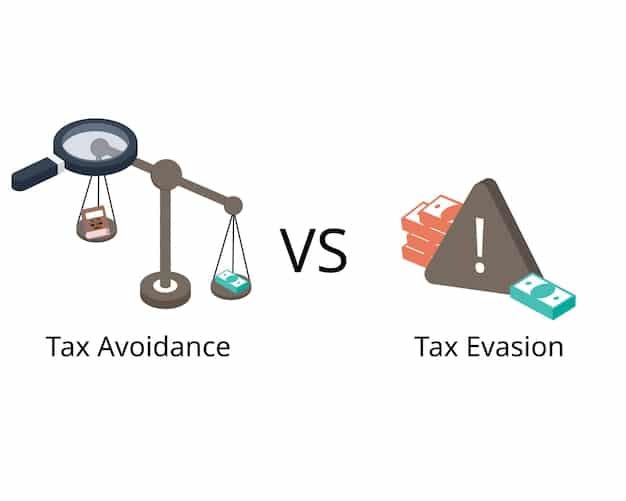New Tax Law Changes for 2025: Understand the Impact on Your Taxes

New Tax Law Changes for 2025: How Will It Affect Your Returns? This article provides a comprehensive overview of the expected changes in tax laws for 2025 in the US, focusing on how these changes could impact individual and business tax returns, offering insights into potential adjustments and planning strategies.
Navigating the complexities of tax laws can be challenging, especially when significant changes are on the horizon. The new tax law changes for 2025: how will it affect your returns? is a question on the minds of many US taxpayers.
Understanding the Impending Tax Law Overhaul
The year 2025 is poised to bring about substantial alterations in the US tax landscape. These changes stem primarily from provisions within the Tax Cuts and Jobs Act (TCJA) of 2017, which are scheduled to sunset at the end of 2025. Understanding the nature and scope of these changes is crucial for taxpayers to prepare effectively.
The TCJA brought about significant modifications to individual income tax rates, deductions, and credits. As these provisions expire, the tax environment will revert to pre-TCJA regulations, introducing both challenges and opportunities for taxpayers. This reversion will impact various facets of tax planning, necessitating a proactive approach.

Key Provisions Expiring in 2025
Several key provisions of the TCJA are set to expire, significantly altering the tax landscape. These include changes to individual income tax rates, the standard deduction, and various itemized deductions.
- Individual Income Tax Rates: The TCJA lowered individual income tax rates across various brackets. Expiration means a return to higher rates, potentially increasing tax liabilities for many.
- Standard Deduction: The TCJA nearly doubled the standard deduction, reducing the number of taxpayers who itemize. A reset to pre-TCJA levels could result in more taxpayers itemizing deductions.
- Itemized Deductions: Modifications to itemized deductions, such as the state and local tax (SALT) deduction, will revert. This can impact taxpayers in high-tax states significantly.
Expiration of these provisions necessitates a review of current tax strategies. Taxpayers need to identify how these changes will personally affect them and develop strategies to mitigate potential increases in tax liabilities.
Individual Income Tax Rate Adjustments
One of the most impactful aspects of the impending tax law changes is the adjustment to individual income tax rates. The TCJA temporarily lowered these rates, and their expiration will bring about a return to pre-TCJA levels. This shift will affect tax liabilities across income brackets, requiring taxpayers to reassess their financial planning.
The adjustments will not be uniform across all income levels. Some brackets will see more significant increases than others, underscoring the importance of understanding one’s specific tax situation. This knowledge is crucial for accurate forecasting and effective tax management.
Impact on Different Income Brackets
The impact of tax rate adjustments will vary depending on income levels. Higher-income earners may experience more significant increases in their tax liabilities due to higher rates on larger portions of their income. Lower and middle-income earners will also be affected, though potentially to a lesser extent.
- High-Income Earners: These taxpayers are likely to see the most significant increases in their tax liabilities. Planning strategies, such as maximizing retirement contributions and utilizing tax-advantaged investments, become even more critical.
- Middle-Income Earners: While the impact may be less pronounced than for high-income earners, middle-income taxpayers will still experience changes. Adjustments to withholding and estimated tax payments may be necessary.
- Low-Income Earners: Changes to deductions and credits may have a more substantial impact on low-income earners than rate adjustments. Understanding eligibility for various credits and deductions is vital.
Accurate income projection and tax planning are essential to navigate these rate adjustments effectively. Tools like tax calculators and consultations with financial advisors can provide valuable insights.
Standard Deduction and Itemized Deductions Revisions
The standard deduction and itemized deductions are fundamental components of the US tax system. The TCJA brought significant changes to these areas, and the impending sunset will revert them to pre-TCJA levels. Taxpayers need to understand how these revisions will impact their tax liabilities and adjust their strategies accordingly.
The standard deduction nearly doubled under the TCJA, which led to fewer taxpayers itemizing. As it reverts, many taxpayers who previously took the standard deduction may find it more advantageous to itemize. This shift will require careful evaluation of eligible deductions.

- Reverting Standard Deduction: As the standard deduction decreases, more taxpayers will likely itemize, especially those with significant deductible expenses.
- Changes to SALT Deduction: The TCJA limited the state and local tax (SALT) deduction to $10,000. The future of this limitation is uncertain, affecting taxpayers in high-tax states.
- Other Itemized Deductions: Changes to deductions like mortgage interest and charitable contributions also affect overall tax liabilities.
Strategic planning and documentation of potential itemized deductions are essential. Taxpayers should keep accurate records of expenses such as medical bills, charitable donations, and mortgage interest to take full advantage of available deductions.
Business Tax Provision Modifications
Beyond individual income taxes, the 2025 tax law changes will also have a significant impact on businesses. The TCJA included several provisions affecting corporate tax rates, deductions, and credits. As these provisions expire, businesses need to understand the implications and prepare accordingly.
The most noteworthy change for businesses was the reduction of the corporate tax rate from 35% to 21%. As this provision sunsets, businesses may face higher tax rates, impacting profitability and investment decisions. Planning for these changes is critical for maintaining financial stability.
Corporate Tax Rate and Deductions
Corporate tax rates and deductions are critical considerations for business tax planning. Adjustments in these areas affect a company’s bottom line and investment strategies.
The reduced corporate tax rate under the TCJA provided a significant boost to many businesses. If this rate increases, companies will need to reassess their financial strategies, including pricing, investment, and capital expenditures.
Strategies for Business Tax Planning
To mitigate the impact of potential business tax increases, businesses should focus on strategic tax planning. Actions that may be taken include evaluating depreciation methods, maximizing eligible deductions, and optimizing business structure.
Taxpayers should explore available credits and incentives, such as research and development credits, energy-efficient credits, and other industry-specific incentives. Taking advantage of these opportunities can help offset potential tax increases.
Investment and Estate Planning Implications
Tax law changes can have far-reaching implications for investment and estate planning. Understanding these implications is essential for individuals looking to protect their assets and ensure a smooth transfer of wealth to future generations. The adjustments set for 2025 could significantly alter the landscape of these planning strategies.
Investment and estate planning are closely linked to tax laws. Changes in capital gains rates, dividend taxation, and estate tax thresholds can influence investment decisions and estate planning strategies. Keeping abreast of these changes is crucial for effective financial management.
Capital Gains and Dividends
Changes in tax laws can impact how capital gains and dividends are taxed. Taxpayers need to understand these changes to make informed investment decisions.
Adjustments to capital gains rates could influence investment strategies, particularly for high-net-worth individuals. Decisions on when to realize capital gains must be considered in light of potential tax liabilities.
Estate Tax Thresholds
Estate tax thresholds also play a critical role in estate planning. The TCJA significantly increased the estate tax exemption, but as this provision sunsets, the exemption amount may decrease, impacting estate planning for wealthy families.
- Reviewing Estate Plans: Individuals with substantial estates should review their plans to ensure they align with potential tax law changes. Strategies such as trusts and gifting may become more relevant.
- Gifting Strategies: Gifting assets during one’s lifetime can be an effective way to reduce the size of the taxable estate. Understanding annual gift tax exclusions is essential.
Seeking professional financial and legal advice is crucial for navigating the complexities of investment and estate planning in light of changing tax laws. Expert guidance can help taxpayers develop strategies tailored to their unique circumstances.
Strategies for Adapting to the New Tax Landscape
As the tax landscape evolves with the impending changes in 2025, taxpayers need to adopt proactive and well-informed strategies to mitigate potential negative impacts. These strategies involve a mix of financial planning, tax optimization, and careful decision-making.
Tax planning is not a one-time event but an ongoing process. Continuously monitoring tax law changes and making adjustments to financial strategies as needed is essential. Professional guidance from financial advisors and tax professionals can be invaluable in this process.
Maximizing Deductions and Credits
One key strategy is to maximize eligible deductions and credits. Understanding which deductions and credits are available and ensuring accurate documentation can significantly reduce your tax liabilities.
- Documenting Deductions: Keep detailed records of all potential deductions, such as medical expenses, charitable contributions, and business expenses.
- Tax Credits: Take advantage of available tax credits, such as the child tax credit, earned income tax credit, and education credits.
Review your withholding and estimated tax payments to ensure they align with your current tax situation. Adjustments may be necessary to avoid underpayment penalties.
Seeking Professional Advice
Navigating the complexities of tax laws can be challenging. Seeking professional advice from financial advisors and tax professionals is highly recommended.
Consulting with a financial advisor can provide personalized guidance tailored to your financial situation. Advisors can help you develop strategies to optimize your tax outcomes and achieve your financial goals.
| Key Point | Brief Description |
|---|---|
| 🔑 Expiring Tax Provisions | Several provisions from the TCJA are set to expire, impacting individual and business taxes. |
| 💼 Business Tax Changes | Adjustments in corporate tax rates and deductions will require strategic business tax planning. |
| 💰 Investment Planning | Tax law changes influence capital gains, dividends, and estate tax thresholds. |
| 📈 Adapting Strategies | Maximizing deductions, seeking professional advice, and ongoing monitoring are crucial. |
Frequently Asked Questions (FAQ)
▼
The most significant changes include the expiration of several provisions from the Tax Cuts and Jobs Act (TCJA), impacting individual income tax rates, the standard deduction, and various itemized deductions.
▼
As the standard deduction reverts to pre-TCJA levels, more taxpayers may find it advantageous to itemize deductions rather than taking the standard deduction.
▼
Businesses may face changes in corporate tax rates and deductions, impacting profitability and investment decisions. Strategic tax planning will be essential.
▼
Consider potential changes in capital gains rates and dividend taxation. Consult a financial advisor to optimize your investment portfolio in light of these changes.
▼
Consult with financial advisors and tax professionals who can provide personalized guidance based on your unique financial situation and tax needs.
Conclusion
As the clock ticks towards 2025, the impending tax law changes necessitate proactive planning and informed decision-making. By understanding the potential impacts and adopting suitable strategies, individuals and businesses can navigate the new tax landscape effectively, ensuring financial stability and minimizing tax liabilities.





